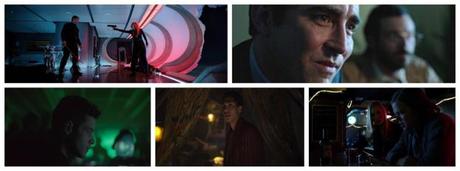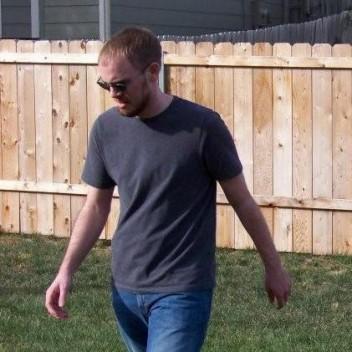The following might feel like film school 101 material, but it's a memo the Game of Thrones people didn't get: there's a significant difference between darkened mood lighting and so dark the viewer can't see anything. Where possible, never fall into the latter category.
I genuinely don't understand the impulse for people to shout down anyone who says Game of Thrones is too dark. Good for you if you could see it all crystal clear on your TV, but here are some random unaltered screenshots: pic.twitter.com/1sZN01lDOE
- Hannah Shaw-Williams (@HSW3K) April 29, 2019
Oops.
Game of Thrones has been found guilty of committing that cardinal cinematic sin and is now in the odd position of defending itself against critics who argue they simply couldn't tell what was happening most of the time in the show's biggest episode. There are reasons and explanations for this which I'll explore, but Game of Thrones is hardly an outlier here. If you haven't noticed, most prestige TV today is dark as f and I'm not talking about the tone or storylines. No, TV cinematographers have settled on "dark" as the ideal lighting choice to communicate "serious."
Let's flash back to last Sunday night and the scene in countless living rooms around the world as families and friends gathered to take in Game of Thrones:
The Battle of Winterfell. Jon Snow vs. The Night King. Two fire-breathing dragons versus one ice-breathing zombie dragon. All of our favorite characters up against a seemingly endless zombie army. The only guarantee is there's no guarantee who will survive. Seemingly everyone other than maybe Jon and Dany are on the chopping block here. Winter. Has. Come! Let "The Long Night" begin.
Years - years! - we've waited for this moment. The hype could not be any higher, and the work put in by the Game of Thrones cast and crew could not have been any harder. They rehearsed for an entire month and then filmed the epic battle across 55-straight nights. Only blockbuster movies usually do that kind of thing, which is why it's hardly surprising that "The Long Night" is set to be an extra-long 82 minutes.
Finally, the episode starts, but just as quickly as it begins a backlash forms. No, the internet isn't irate over a quick character death or questionable Benioff/Weiss story decision. This particular complaint boils down to something more elemental: people simply can't make out anything they're seeing.
Who just died? How many dragons does Dany have left now? It's all so dark! The show's always kind of dark, but it's never been this bad before. All of that anticipation and our reward is being asked to squint at our TVs just to see what's happening.
Frustrating, right? That was certainly my response: loved the episode's tension, pacing, sequencing, and ending, but also kind of couldn't tell what was going on half the time. I also happened to be live-streaming it on HBO Now in a completely darkened room and the nicest TV I have available to me. Didn't seem to make a difference.
If you ask the episode's cinematographer Fabian Wagner, this is all our fault for being too stupid to know how to set our TVs. He told Wired, "A lot of the problem is that a lot of people don't know how to tune their TVs properly. A lot of people also, unfortunately, watch it on small iPads, which in no way can do justice to a show like that anyway." Elsewhere, he adopted a more Nixonian tone, telling TMZ, "I know it wasn't too dark because I shot it."
HBO's got his back, telling Motherboard "there were not issues across any of HBO's platforms." However, Motherboard, Consumer Reports, Gizmodo, and Vulture beg to differ, with Gizmodo 's Alex Cranz concluding:
"The makers of Game of Thrones almost certainly blew it here. They did not take into account two big factors. First, that people would watch streams which could downgrade thanks to the demands on the servers of HBO and other services, and second, that people would watch the episode on uncalibrated displays in rooms that weren't lit like a movie house."
That this all happened the same weekend as Avengers: Endgame is a bit ironic:
Endgame is a blockbuster movie with a TV show's serialized storytelling mentality, and Game of Thrones is a serialized TV show with a blockbuster movie's mentality. By an odd twist of fate, both entities reached their cultural zenith this past weekend, with Endgame conquering all box office records everywhere and Game of Thrones' "The Long Night" becoming the most-tweeted-about TV episode ever. Endgame proved that long-form storytelling and cinema can actually go together; Game of Thrones, however, proved that treating your TV show like a movie introduces a whole slew of new variables to contend with, such as screen resolutions and streaming bandwidth.
To put it another way, the Game of Thrones people shot "The Long Night" as if everyone who watched it would do so on properly calibrated, newer TVs and they certainly wouldn't be live-streaming it in a compressed form on HBO Now. Big mistake. In the long run, those wanting to truly appreciate Wagner's work can buy the season 8 Blu-Ray and experience "The Long Night" as it was meant to be seen. However, this feels like an issue which HBO and Game of Thrones should have anticipated. Their double-down-on-defiance response indicates they didn't.

This might be the most high profile case so far, but "The Long Night" is hardly the first time Game of Thrones has been accused of being underlit. It's also a criticism which has been extended to multiple other prestige dramas in the peak TV era. Other repeat offenders include Daredevil, Jessica Jones, Iron Fist, Luke Cage, Ozark, Halt and Catch Fire, The Walking Dead, Altered Carbon, Mr. Robot, The Chilling Adventures of Sabrina. Some of those, even if they wildly over-do it, at least have a built-in excuse, like being primarily set at night ( Daredevil) or indebted to film noir ( Jessica Jones); others, however, actively chose shadow and flat visuals for tone and effect.
It's as if an entire generation of showrunners grew up watching USA's signature line of blue sky dramedies from decades past like Monk and Burn Notice and decided to adopt a lighting scheme which is the complete opposite of those shows. Because if they don't make everything as dark as the Texas night then viewers might not get that it's a drama?
Other outlets have noticed and commented on this frustrating phenomenon. For example, Vulture noted, "This concept of 'prestige' TV, and its accompanying shadowy solemnity, is an invention of the past 20 years. The color possibilities for TV dramas are now endless. Why does it too often feel like we're Dorothy and we've woken up in Oz, only to find that the yellow brick road looks beige at best?"
Yet, Vulture argued, this isn't a simple follow-the-leader scenario, at least not the most obvious leaders since iconic shows like Mad Men, Breaking Bad, and Stranger Things deploy far more varied lighting schemes than something like Mr. Robot.
Reaching out for some kind of explanation, TVLine got this from an unnamed veteran TV producer, "I'm guessing it's a case of directors - and more often showrunners/producers - trying to get too cinematic. It could also just be a screw-up where people forget that their perfect set-up in their color timing doesn't mean it'll work for everyone. It could also be a showrunner trying to hide sins."
So, is it possible that Game of Thrones had to do as so many low-budget horror movies before it and simply bathe everything in darkness to make it easier on the make-up/prosthetics people and special effects crews to produce work not exposed to the unforgiving light of day?
Given the show's budget and the high number of prior scenes featuring the zombies in the daytime, this explanation isn't likely, at least not entirely on its own. Instead, a group of filmmakers appreciated only the image in front of them and not the image as it would appear on multiple streaming devices or after HBO's streaming servers had to downgrade the quality to keep up with demand.
Countless other prestige dramas have made similar mistakes because at some point "prestige" became synonymous with underlit scenes so the audience knows they're truly watching a drama - not one of those annoyingly well-lit comedies or broadcast procedurals where you can actually tell what's happening all the time. However, it's also a byproduct of our here and now where the quality of storytelling on TV has surpassed movies but the variety of ways in which we can consume TV has and will continue to vex cinematographers for years to come.
What do you think? Is lighting even an issue for you with TV shows? Are there shows I didn't mention which are also chronically underlit? Or is this whole thing overblown and you had no problem following the action in "The Long Night?" Let me know in the comments.

Grew up obsessing over movies and TV shows. Worked in a video store. Minored in film at college because my college didn't offer a film major. Worked in academia for a while. Have been freelance writing and running this blog since 2013. View all posts by Kelly Konda

